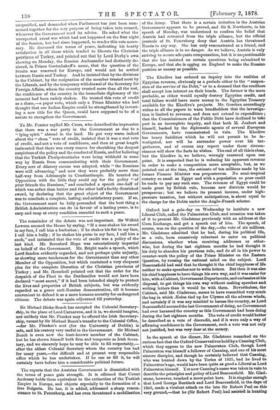The Khedive has ordered an inquiry into the realities of
Egyptian revenue, obviously as a prelude either to the "suspen- sion of the service of the Debt," or to a demand that the creditors shall accept less interest on their bonds. The former is the more probable, as either would equally destroy Egyptian credit, and total failure would leave more money in the Egyptian Treasury available for the Khedive's projects. Mr. Goschen accordingly writes to all the papers to warn bondholders that the investiga- tion is limited to revenue, and does not extend to expenditure ; that the Commissioners of the Public Debt have declined to take part in an incomplete inquiry, and that both M. Joubert and himself, backed by the diplomatic agents of several European, Governments, have remonstrated in vain. The Khedive has heavy liabilities which he will not permit to be in- vestigated, nor will he surrender power over his tax- gatherers, and of course any report under those circum- stances will show the facts he wishes. The end of all this is clear,. but the Khedive is, we believe, wrongly censured upon one point. It is suspected that he is reducing his apparent revenue- in order to make a composition more acceptable, but, as we- pointed out at the time, the estimate of ten millions made by his former Finance Minister was preposterous. No semi-tropical country so small as Egypt and with a population so poor could be made to pay any such sum. The revenue of Egypt could be made great by British rule, because new districts would be prosperous ; but we believe its present income, under high- pressure taxation, but without anticipations, is about equal to- the charge for the Debts under the Anglo-French scheme.


































 Previous page
Previous page